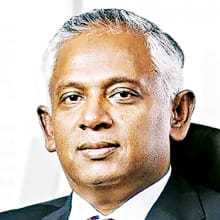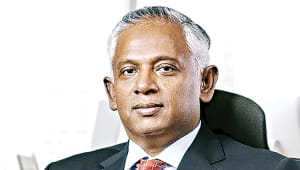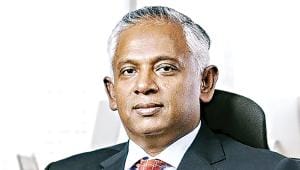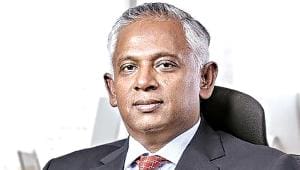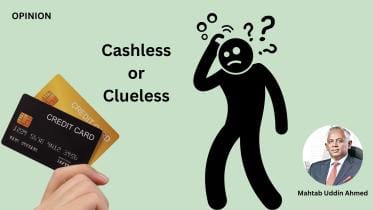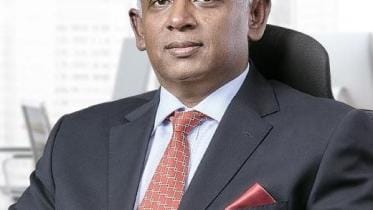Trust beyond numbers
If you have ever seen a group photograph of professional accountants, you might notice something curious. Everyone looks serious, composed, almost expressionless. It is not that accountants dislike joy. They simply know that smiling in public can lead to someone asking for “just a quick look at my accounts”, which is never quick, never simple and rarely free of emotional pain.
6 November 2025, 18:00 PM
The art of letting go
Last Eid-ul-Azha, I watched my mama in Banani decide he would handle the entire qurbani himself: choosing the cow, doing the paperwork, collecting the cash, sending out the cuts, even cooking the curry while wearing a whistle for some reason.
30 October 2025, 18:00 PM
Why you need to be bored
If you ever find yourself stuck in traffic at Mohakhali Flyover, you will probably notice your hand reaching for your phone before the CNG ahead even coughs out a cloud of black smoke.
23 October 2025, 19:45 PM
The courage to copy
If you walk into a startup pitch competition in Dhaka, it often feels like going to a winter wedding. Everyone wears the same panjabi and waistcoat, and talks about disruption in the same polished accent they learned from a YouTube video.
16 October 2025, 18:00 PM
Signals of change: Telecom Policy 2025
Bangladesh’s Telecommunication Network and Licensing Policy 2025 represents the most ambitious reform since the 2010 ILDTS framework
9 October 2025, 14:43 PM
Purpose beyond profit
A CEO in Dhaka once gathered his managers and declared with great seriousness, “Our company has only one purpose: to maximise profit.
2 October 2025, 18:00 PM
Paperwork over powerplay
One of my friends has been working with a government agency for the last three years on a project, bringing more than a decade of hard-earned experience to the table, as well as the rare distinction of having actually managed the kind of project they were struggling with.
25 September 2025, 18:00 PM
Turning toxic politics into purpose
A king once set out to tour his kingdom with an assistant. In the very first village they visited, they discovered that water and ghee were being sold at the same price.
18 September 2025, 18:00 PM
The soul of wealth
The wealthiest man in the city once promised to donate gold equal to the weight of a cow at a charity event. The organisers, being business-minded, asked for some time, not to think but to fatten the cow, and immediately started feeding it biryani to make it heavier.
11 September 2025, 18:00 PM
Job hugging!
We have always been champions of hugging. From clutching relatives at weddings long enough to make the stage creak, to embracing one another at mosques after prayers, to greeting colleagues with theatrical warmth at the first meeting of the week. And of course, the masters of the art, our politicians, hugging voters before elections with dazzling smiles, then hugging power afterwards as if their lives depended on it.
4 September 2025, 18:00 PM
The untapped power of sorry
In our country, the word “sorry” is rarer than electricity on a summer evening. Not because we do not make mistakes. We produce them in bulk. From call drops to collapsing bridges, from delayed mega projects to disappearing dollars, we are world-class exporters of errors.
28 August 2025, 18:00 PM
No cash, no corruption
Money lives two parallel lives. For the poor villager, it hides in the folds of a lungi, under a mattress, or in the holy corner of the rice jar, because who needs banks when you have God? Meanwhile, the rich gentleman (read: political or business elite) does not believe in such simplicity. His money takes the first flight out—to Dubai, Singapore, London—anywhere but here. The result? One half of the nation is literally sleeping on cash, while the other half is ensuring that Bangladesh itself remains penniless.
21 August 2025, 18:00 PM
No Cash, No Corruption
Cash does not leave a trail. It is not about convenience; it is about invisibility
21 August 2025, 14:07 PM
Youthless Bangladesh, brainless future
Arif left for Australia, declaring he would “be a manager within months”. True enough, he now proudly manages the dishwashing section at a bustling café. He even has a team: two other part-timers and an industrial sink. Back home, his family tells neighbours he is in hospitality management, and technically, no one can say they are lying!
14 August 2025, 18:00 PM
Be bold or be boring
We have two kinds of brave people. One, the man who casually crosses a six-lane road while talking on the phone, blind to buses, rickshaws, and divine intervention.
7 August 2025, 18:06 PM
From CEO to scapegoat
Being a CEO is like being the goat at a family wedding: pampered, praised, and then served at dinner. One wrong question or bruised ego, and the corner office starts to feel like a trapdoor. The same board that once called you “family” suddenly avoids eye contact. It’s a shiny job title wrapped in politics, where survival depends more on diplomacy than performance.
31 July 2025, 18:00 PM
No degree, no worries
“My grandfather was a Chowdhury, how can I be a carpenter?”—a classic Bangladeshi mindset, where jobs involving tools, wheels, or grease are treated like social demotion.
24 July 2025, 18:00 PM
Power of perspective
Two shoe salesmen were sent to a remote village to assess the market. The first returned, visibly deflated. “Hopeless! No one wears shoes there,” he said. The second came back beaming, saying, “Amazing! No one wears shoes there!” Same village, same people, same situation, different perspectives. One saw zero demand, the other saw untapped potential.
17 July 2025, 18:00 PM
Barriers to embracing AI
In Bangladesh, numerous negative stories exist aimed at discrediting AI and discouraging its adoption. One school introduced AI to grade Bangla essays.
10 July 2025, 18:00 PM
Eyes that lead
A classic and familiar office tale: Meet VP (Vice President) Mojnu. Mojnu bhai, known for his “strict leadership,” has one peculiar habit: never making eye contact.
3 July 2025, 20:23 PM



